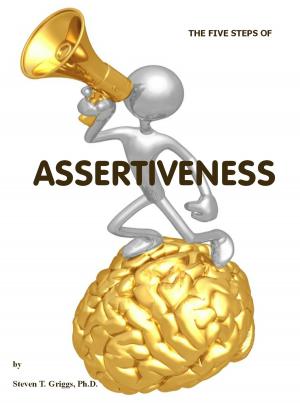How To Change Teenager's Behavior
Nonfiction, Family & Relationships, Adolescence, Health & Well Being, Psychology, Child & Adolescent, Child Development| Author: | Steven T. Griggs, Ph.D. | ISBN: | 9781476380315 |
| Publisher: | Steven T. Griggs, Ph.D. | Publication: | April 28, 2012 |
| Imprint: | Smashwords Edition | Language: | English |
| Author: | Steven T. Griggs, Ph.D. |
| ISBN: | 9781476380315 |
| Publisher: | Steven T. Griggs, Ph.D. |
| Publication: | April 28, 2012 |
| Imprint: | Smashwords Edition |
| Language: | English |
First, there is a description of the terms I use throughout the manuscript. Some are unique to me. There's eight or nine you need to know.
I start by guiding you through behavior selection; that is, what is it you want to change about your teen? This is straightforward, but the twist is that I don't work primarily with negative behaviors; rather, I focus on the opposite of them--the ones that are positive and cancel out the negative ones. This is unique. In the literature, there are three ways to reinforce behaviors, but my way is the fourth.
Ever heard of the Four-To-One-Rule? Not likely, because its something I discovered over years of practice. I use it specifically with the technique just described. This is what I use instead of punishment, whenever possible. Just in case you think punishment is not discussed, there are several pages devoted to just this concept--where and when to use it, but most importantly, when and why not to use it.
Next comes a section on Strategies and Examples. There are lots...
I have another unique concept--The Dance. This is the intricate interaction parents and children experience from day one to maturity. I describe it in detail, and how to conceptualize it to manage errant teen behaviors.
Because teenagers are beset (not to mention hugely burdened) by hormones, they react to situations in an exaggerated way. I describe how to assess this and when to call in a specialist. In other words, what is normal and what is not normal behavior at this age?
This brings into discussion teenager's needs, followed by a discussion of teen's moods--both amplified by developmental stage, and again, by hormones.
Needs and moods are discussed in the context of the twelve most common areas of conflict between parents and teenagers (Out of home activities, curfews, privacy, safety, electronics, comparative age, makeup, dating and sex, driving, grades, criminal behaviors, drugs and alcohol and visitation). Specific examples of each are provided and how to handle them.
The next section is called, "Putting It All Together." In detail, I describe exactly what to do with your teenager, given any particular problem area.
The last section deals with kids who are outside the scope of my ebook, or any self-help manuscript. These are the kids who have significant compromises, sometimes through no fault of their own. Medical conditions, personality disorders, deliberate maliciousness, medication, RTC's, and lastly, being the victims of nasty parental divorces are covered. How to deal with the deeper stuff is what I cover here, and why these have to be addressed before anything else will work, including what I have to offer.
Ebooks are evolving and now have considerable depth. Usually they, and mine specifically, are single subject treatises. They deal with just one topic--"how to's" about any given problem. This one is is aimed specifically at teen behaviors and what to do about them. It's concise, loaded with relevant information and has no fat.
First, there is a description of the terms I use throughout the manuscript. Some are unique to me. There's eight or nine you need to know.
I start by guiding you through behavior selection; that is, what is it you want to change about your teen? This is straightforward, but the twist is that I don't work primarily with negative behaviors; rather, I focus on the opposite of them--the ones that are positive and cancel out the negative ones. This is unique. In the literature, there are three ways to reinforce behaviors, but my way is the fourth.
Ever heard of the Four-To-One-Rule? Not likely, because its something I discovered over years of practice. I use it specifically with the technique just described. This is what I use instead of punishment, whenever possible. Just in case you think punishment is not discussed, there are several pages devoted to just this concept--where and when to use it, but most importantly, when and why not to use it.
Next comes a section on Strategies and Examples. There are lots...
I have another unique concept--The Dance. This is the intricate interaction parents and children experience from day one to maturity. I describe it in detail, and how to conceptualize it to manage errant teen behaviors.
Because teenagers are beset (not to mention hugely burdened) by hormones, they react to situations in an exaggerated way. I describe how to assess this and when to call in a specialist. In other words, what is normal and what is not normal behavior at this age?
This brings into discussion teenager's needs, followed by a discussion of teen's moods--both amplified by developmental stage, and again, by hormones.
Needs and moods are discussed in the context of the twelve most common areas of conflict between parents and teenagers (Out of home activities, curfews, privacy, safety, electronics, comparative age, makeup, dating and sex, driving, grades, criminal behaviors, drugs and alcohol and visitation). Specific examples of each are provided and how to handle them.
The next section is called, "Putting It All Together." In detail, I describe exactly what to do with your teenager, given any particular problem area.
The last section deals with kids who are outside the scope of my ebook, or any self-help manuscript. These are the kids who have significant compromises, sometimes through no fault of their own. Medical conditions, personality disorders, deliberate maliciousness, medication, RTC's, and lastly, being the victims of nasty parental divorces are covered. How to deal with the deeper stuff is what I cover here, and why these have to be addressed before anything else will work, including what I have to offer.
Ebooks are evolving and now have considerable depth. Usually they, and mine specifically, are single subject treatises. They deal with just one topic--"how to's" about any given problem. This one is is aimed specifically at teen behaviors and what to do about them. It's concise, loaded with relevant information and has no fat.















